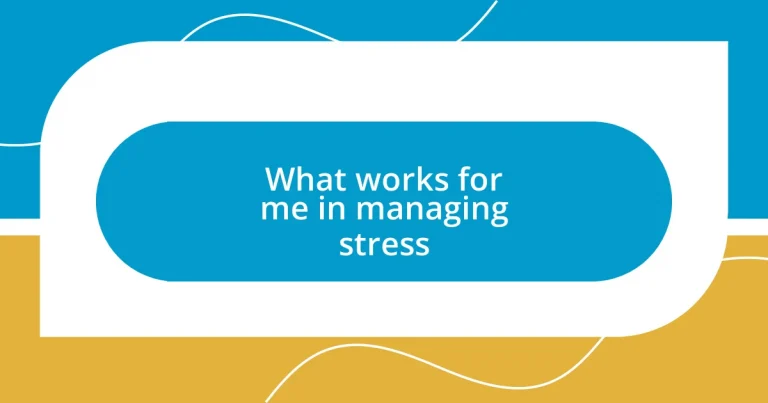Key takeaways:
- Implementing grounding exercises and mindfulness techniques, like focused breathing and guided meditations, can significantly reduce stress and improve mental clarity.
- Establishing a healthy routine, including consistent sleep, regular physical activity, and balanced meals, is crucial for effective stress management.
- Building a supportive network and developing a personalized stress plan with flexible strategies enhances resilience and helps individuals manage stress more effectively.
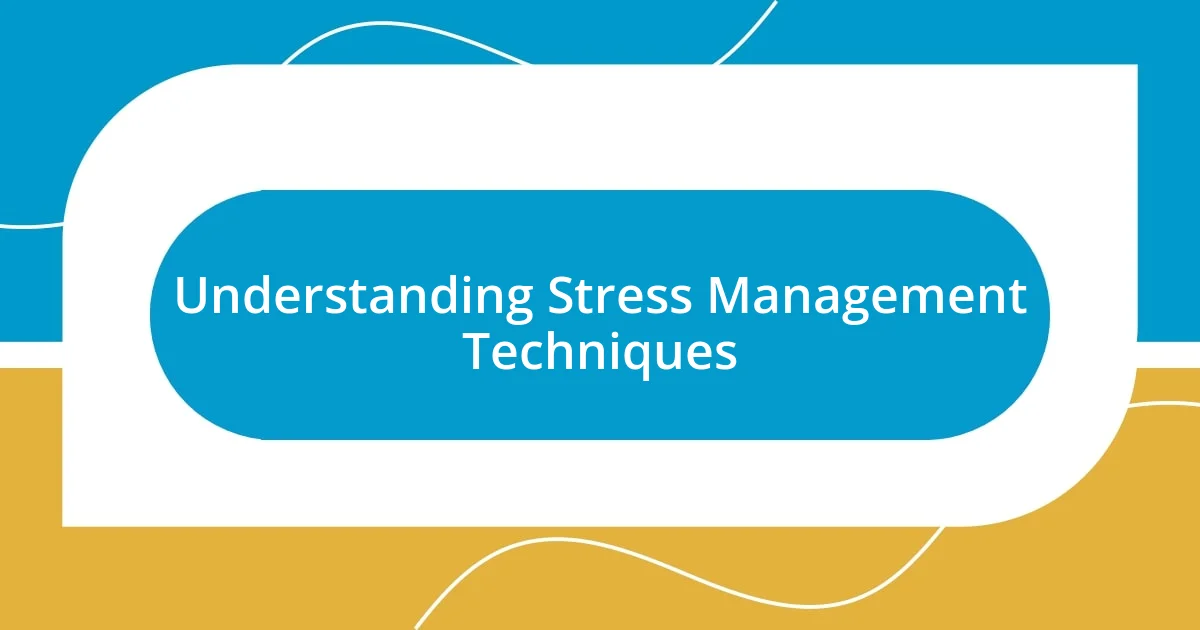
Understanding Stress Management Techniques
Stress management techniques can range widely, and understanding these options can be incredibly empowering. For instance, I’ve found that grounding exercises, like focusing on my breath for just a few minutes, can bring me back to the present when I feel overwhelmed. Isn’t it fascinating how a few deep breaths can shift our entire mindset?
Another technique I’ve embraced is the art of prioritization. When I first started workload management, I often felt like I was drowning in tasks. I learned to categorize my responsibilities, focusing first on what’s urgent and essential. Can you relate to that sense of clarity that washes over you once you tackle your most pressing tasks?
Then there’s mindfulness, which has become a cornerstone of my routine. I vividly remember the first time I tried a guided meditation—my mind raced at first, but as I leaned into the practice, I noticed how much calmer I felt. Have you ever experienced the power of simply being present? That transformative moment of clarity reminds me that managing stress isn’t just about addressing problems, but nurturing our minds and spirits.
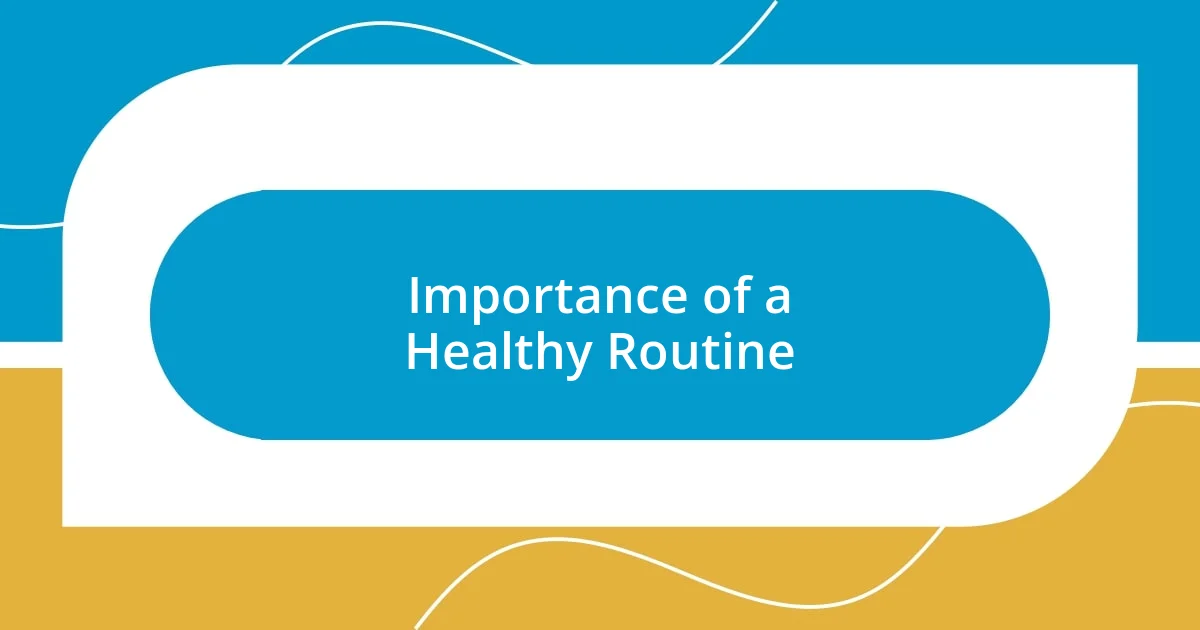
Importance of a Healthy Routine
A healthy routine is crucial for managing stress effectively. I’ve noticed that when I stick to a consistent sleep schedule, I wake up feeling refreshed and ready to tackle the day. It’s amazing how the simple act of going to bed and rising at the same time can dramatically enhance my mood and energy levels, helping to mitigate stress before it even starts.
On the other hand, incorporating physical activity into my daily routine has tremendous benefits. Whether it’s a brisk walk during lunch or a yoga session in the evening, I can feel the stress dissipate as I move my body. I find that movement not only lifts my mood but also clears my mind, allowing me to approach challenges with renewed focus.
Moreover, maintaining regular meal times helps me regulate my energy and mood. I used to skip breakfast, thinking I’d save time, but I quickly realized that it only left me feeling irritable and anxious. Once I started prioritizing balanced meals, I noticed a significant drop in my stress levels. Eating at consistent intervals rejuvenates me and reminds me to care for myself amidst life’s chaos.
| Aspect | Impact |
|---|---|
| Consistent Sleep Schedule | Improves mood and energy |
| Regular Physical Activity | Reduces stress and enhances focus |
| Balanced Meals | Regulates energy and mood |
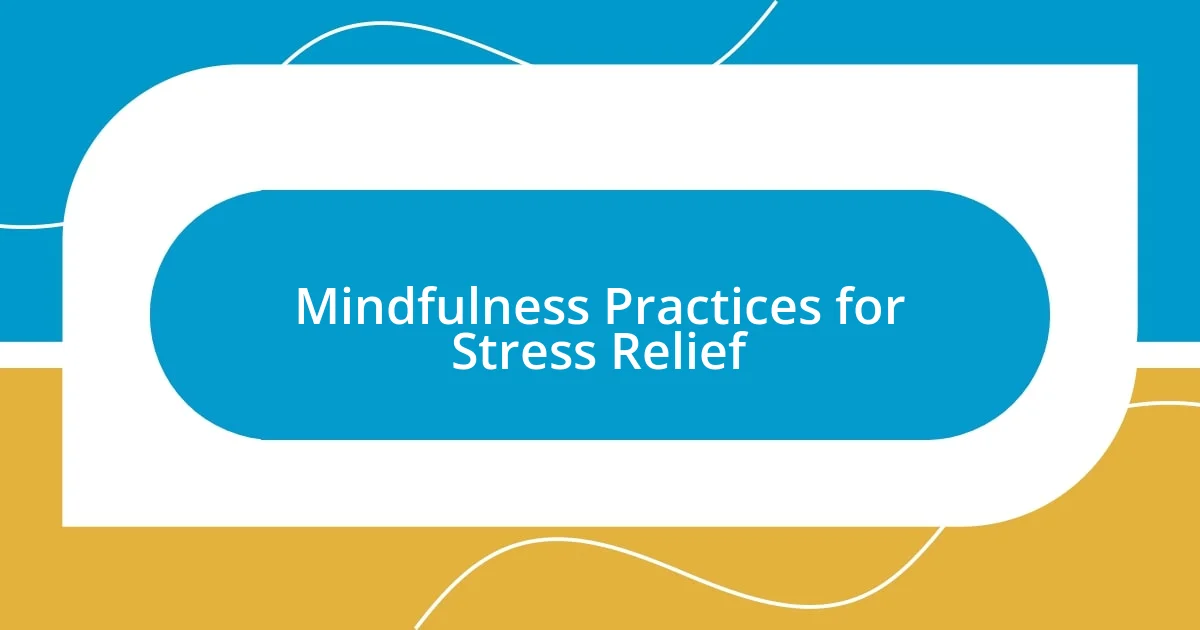
Mindfulness Practices for Stress Relief
I’ve discovered that mindfulness practices are a powerful antidote to stress. On particularly hectic days, I often set aside just ten minutes for a mindful breathing exercise. During these moments, I focus solely on my breath, letting the world fade into the background. It’s remarkable how this simple technique can create a serene bubble around me, allowing me to gather my thoughts and regain control.
Here are a few mindfulness practices that I find especially effective for relieving stress:
- Guided Meditations: I listen to calming meditations, which help me ground my thoughts and let go of anxiety.
- Body Scanning: This involves mentally checking in with different parts of my body, and I always find tension that I didn’t realize I was holding.
- Mindful Walks: Taking a stroll and truly observing my surroundings brings me back to the present, reminding me of life’s simple pleasures.
- Journaling Gratitude: Writing down what I’m grateful for shifts my focus from stress to positivity, and I’ve noticed a significant uplift in my mood.
Embracing these practices hasn’t been a linear journey. Initially, my mind often wandered during meditation, making me feel frustrated. But persisting through those thoughts has deepened my appreciation for the present moment. It’s a fulfilling realization that these moments of mindfulness are not just pauses in my day; they become essential tools for nurturing my mental well-being.
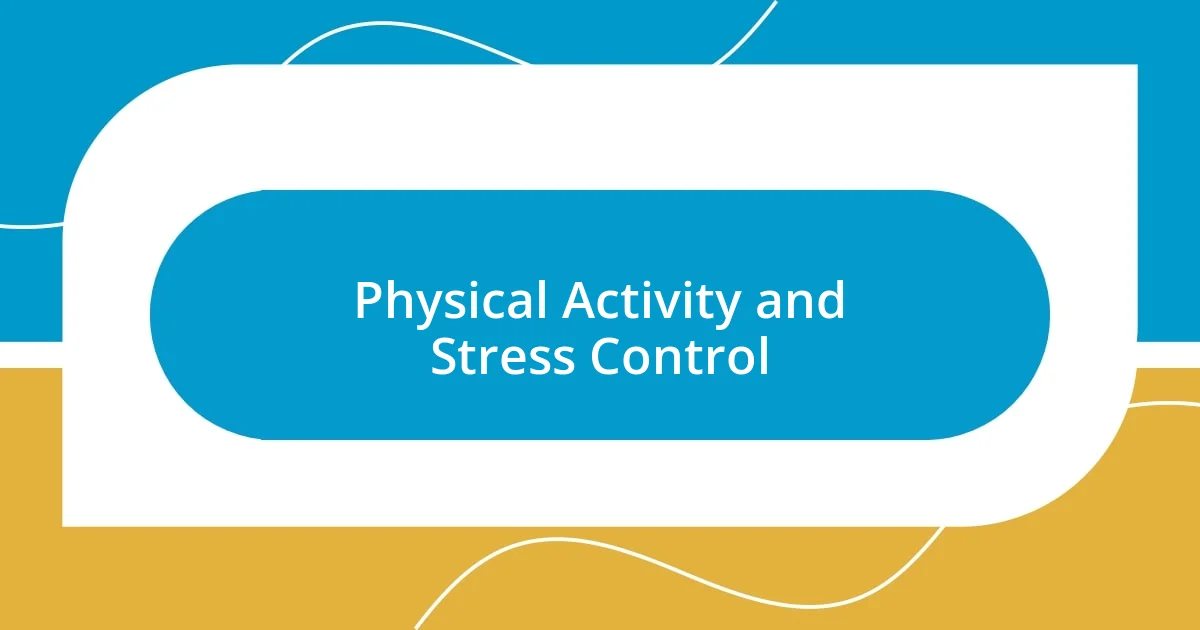
Physical Activity and Stress Control
Physical activity plays a pivotal role in how I manage stress. I recall a particularly overwhelming week at work when everything seemed to pile up. I decided to go for a run after work one evening. The moment I stepped outside and began to feel the rhythm of my feet against the pavement, I could feel my worries start to fade. Is there anything quite like the rush of endorphins after a good workout? For me, it’s like a natural reset button, clearing the fog in my mind and bringing a sense of calm.
I often reflect on the times when I’ve opted for a brisk walk instead of scrolling through my phone during a break. The fresh air combined with gentle movement not only rejuvenates my mind but also sparks creativity. Have you ever noticed how thoughts flow more freely when you’re moving? I find that those moments of physical activity are invaluable; they provide clarity and perspective, allowing me to approach problems with fresh eyes.
On days when routine workouts feel daunting, I’ve turned to dance as a stress reliever. When I crank up my favorite playlist and let go of my inhibitions, it transforms my mood entirely. The joy of movement, paired with the music, becomes an effortless escape from tension. I’ve learned that it’s not just about hitting the gym; engaging in activities that bring me joy can be just as beneficial for stress control. What’s your favorite way to move and shake off stress? It might surprise you how much a little fun in movement can alleviate the weight of the world.
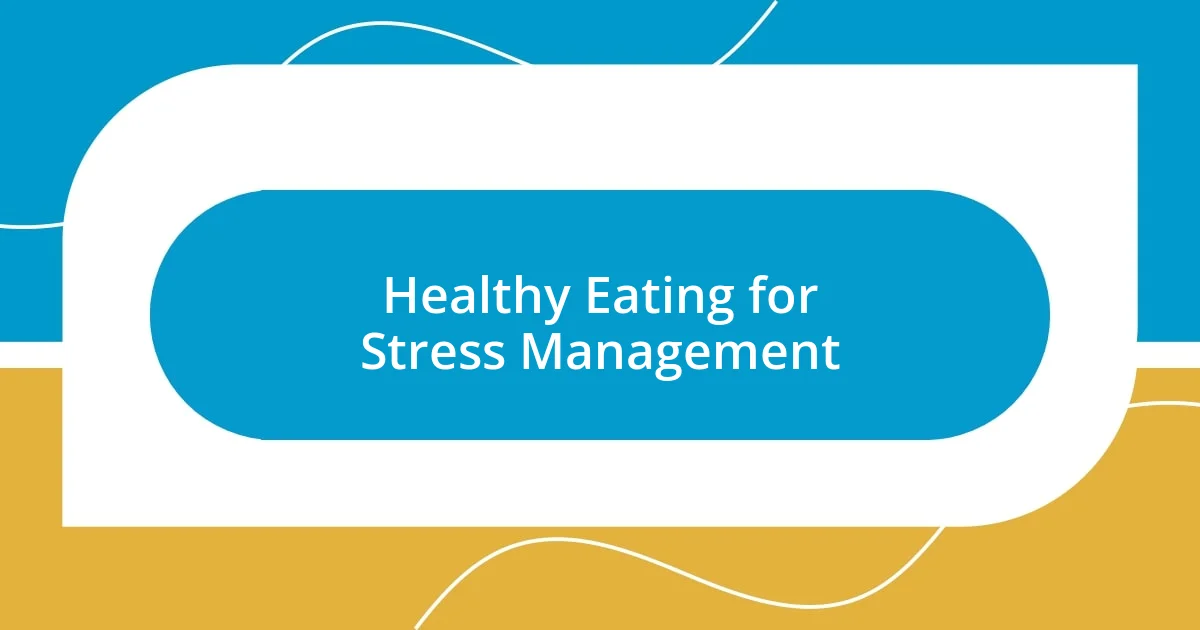
Healthy Eating for Stress Management
Healthy eating is a cornerstone of my approach to managing stress effectively. I remember a time when I indulged too often in unhealthy snacks during stressful workweeks, and I noticed just how sluggish and irritable I became. Switching to a balanced diet filled with fruits, vegetables, whole grains, and lean proteins made such a difference. Have you ever felt that boost of energy after enjoying a vibrant salad? The right foods can truly uplift your mood and sharpen your focus.
Meal prepping has become my secret weapon against impulse eating on chaotic days. By dedicating a couple of hours on the weekend to prepare nutritious meals, I ensure that I have healthy options ready when stress strikes. It’s amazing how a simple homemade quinoa bowl topped with colorful veggies can beat the urge to order takeout. I’ve found that having these meals ready to go reduces my stress levels significantly, as I’m not scrambling to find something good to eat when I’m already overwhelmed.
I also pay attention to my hydration. I used to underestimate the power of water. Now, I’ve made it a habit to carry a reusable water bottle everywhere I go. I can’t tell you how refreshing it feels to sip on water, especially when I’m feeling anxious; it’s almost like giving my brain a gentle reboot! How often do you find yourself reaching for a sugary drink instead of water? Making that simple switch not only calms my body but also sharpens my mind, reinforcing that healthy choices really are integral to stress management.
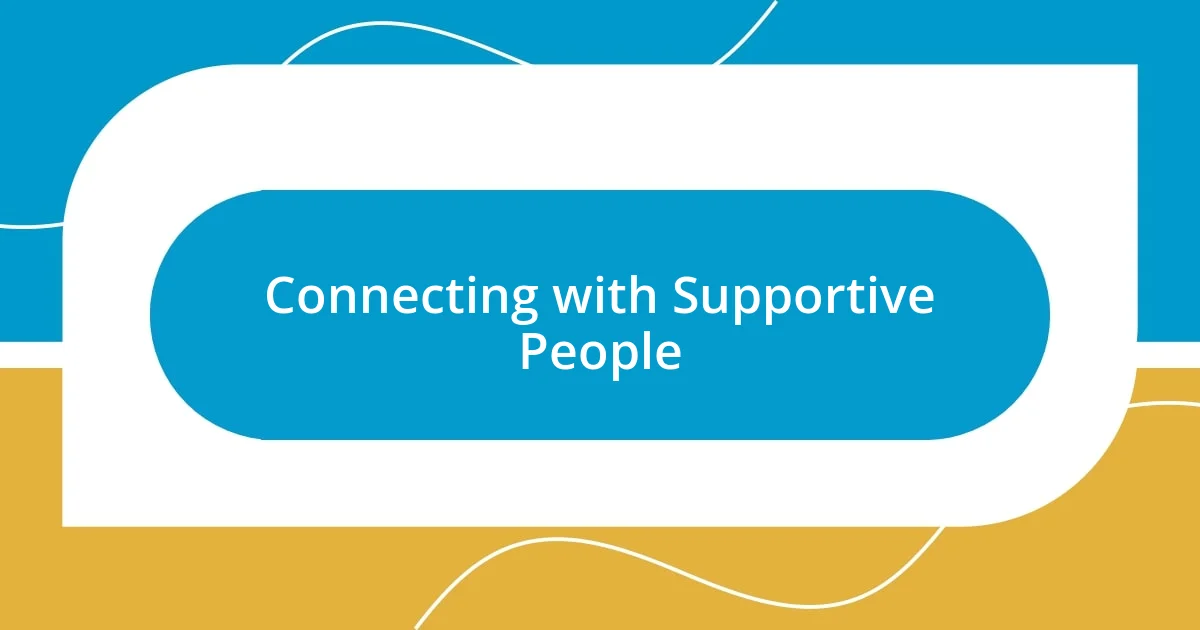
Connecting with Supportive People
Connecting with supportive people has been an essential part of my stress management strategy. I recall one evening, feeling completely overwhelmed after a long day. I reached out to a friend who always has a way of making me laugh. Just hearing their voice and sharing a few jokes lifted my spirits significantly. Is there a friend or family member you turn to when you need a pick-me-up? Having that support network can make all the difference.
I’ve also seen firsthand how surrounding myself with positive, empathetic individuals impacts my mindset. During difficult times, like when I faced challenges at work, my colleagues banded together to lend a listening ear and share their own experiences. Their understanding reassured me that I wasn’t alone in navigating stress. How often do you find yourself sharing burdens with others? It’s powerful to realize that vulnerability can lead to connection, easing the weight we carry.
Building and nurturing these relationships doesn’t just happen overnight; it takes intentional effort. I’ve learned to be proactive in reaching out, whether it’s planning coffee dates or simply checking in via text. It’s in those small, thoughtful moments where I feel support the most. Have you considered connecting with someone you haven’t spoken to in a while? Strengthening those bonds can truly enhance your resilience against stress, reminding us that we’re all in this together.
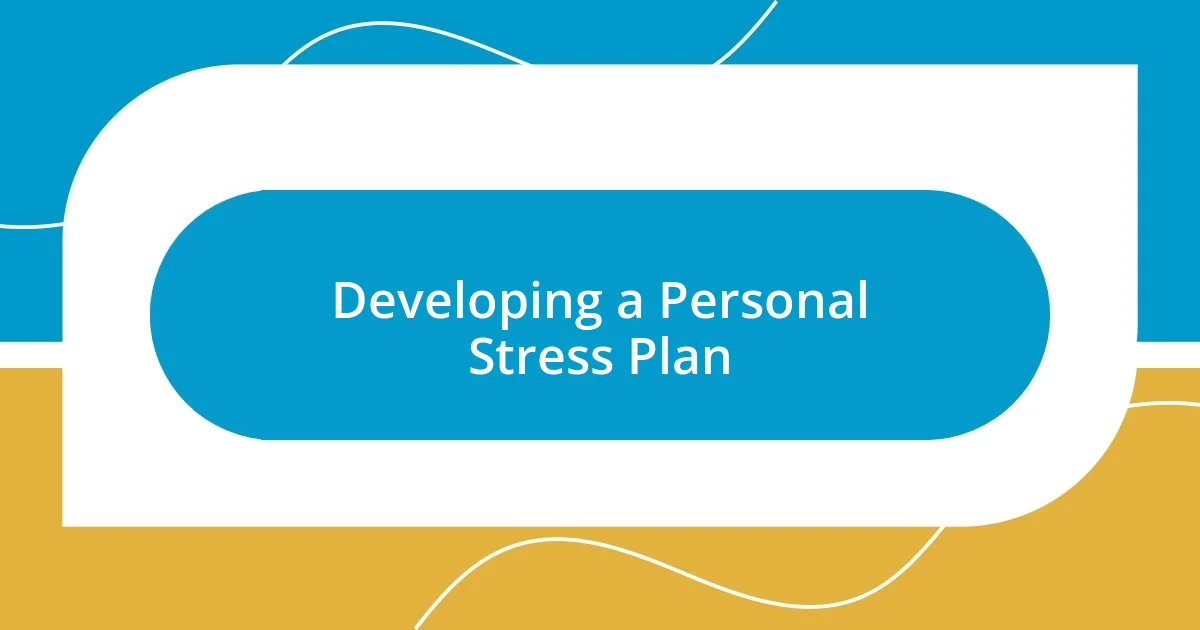
Developing a Personal Stress Plan
Developing a personal stress plan has been a game changer for me. I started by identifying my stress triggers, like tight deadlines or family responsibilities, and then mapping out strategies to tackle them head-on. For instance, when I know a challenging project is looming, I break it into smaller tasks and assign myself realistic deadlines. How often have you faced a mountain of work, feeling paralyzed? Seeing it all laid out in bite-sized pieces helps me breathe a little easier and keep my motivation up.
Regular mindfulness practices have become another key element in my plan. A few minutes of deep breathing or meditative reflection each morning sets a positive, calm tone for the day. I remember one particularly hectic week when I decided to commit to daily meditation. Surprisingly, those quiet moments not only helped me manage my stress but also sharpened my focus during tasks. Have you ever taken a few moments just to pause and collect your thoughts? It can truly reshape how we approach our day.
I also believe in the power of flexibility within my stress plan. Life can throw unexpected curveballs, and I’ve learned the hard way that rigid plans can lead to frustration. There was a time I had meticulously scheduled each hour of my day only to find myself overwhelmed when things didn’t go as planned. Now, I build in buffer times and allow myself the grace to adapt. How do you handle the unexpected? Embracing this flexibility has allowed me to manage stress more gracefully and keep my overall well-being in check.












